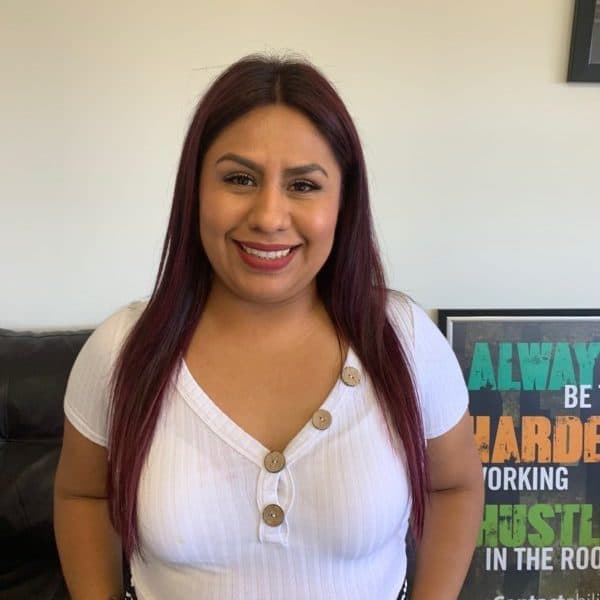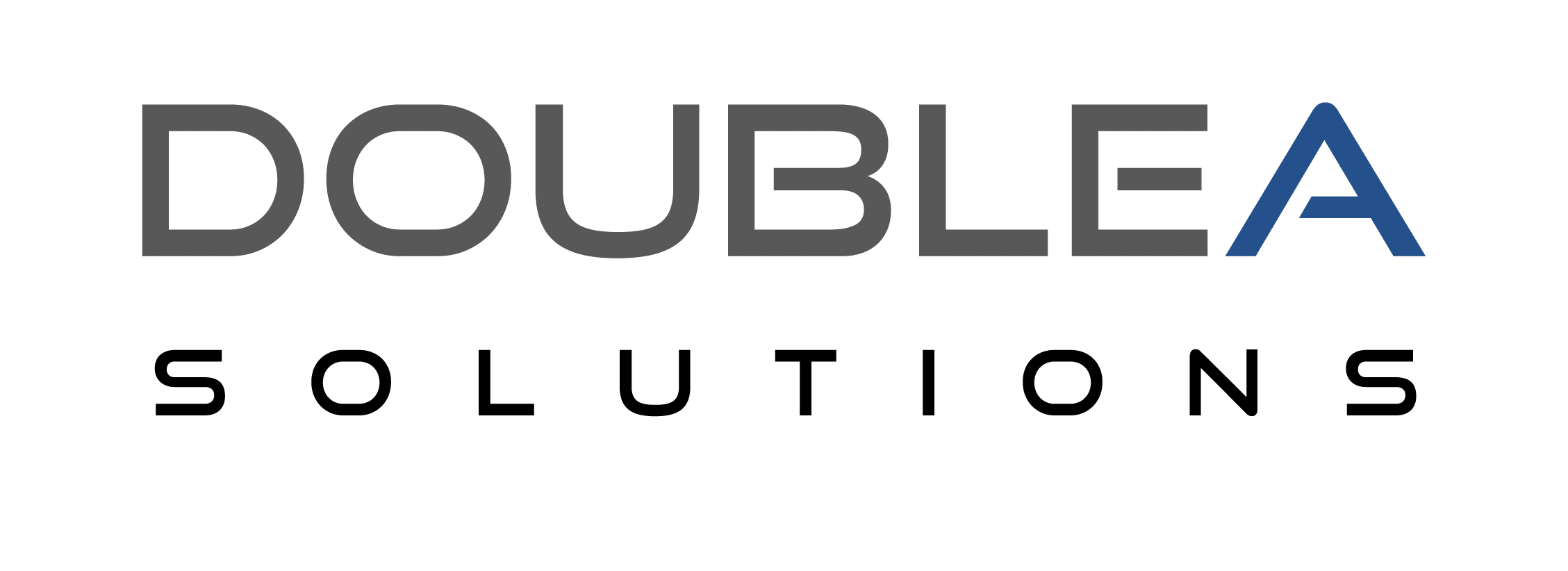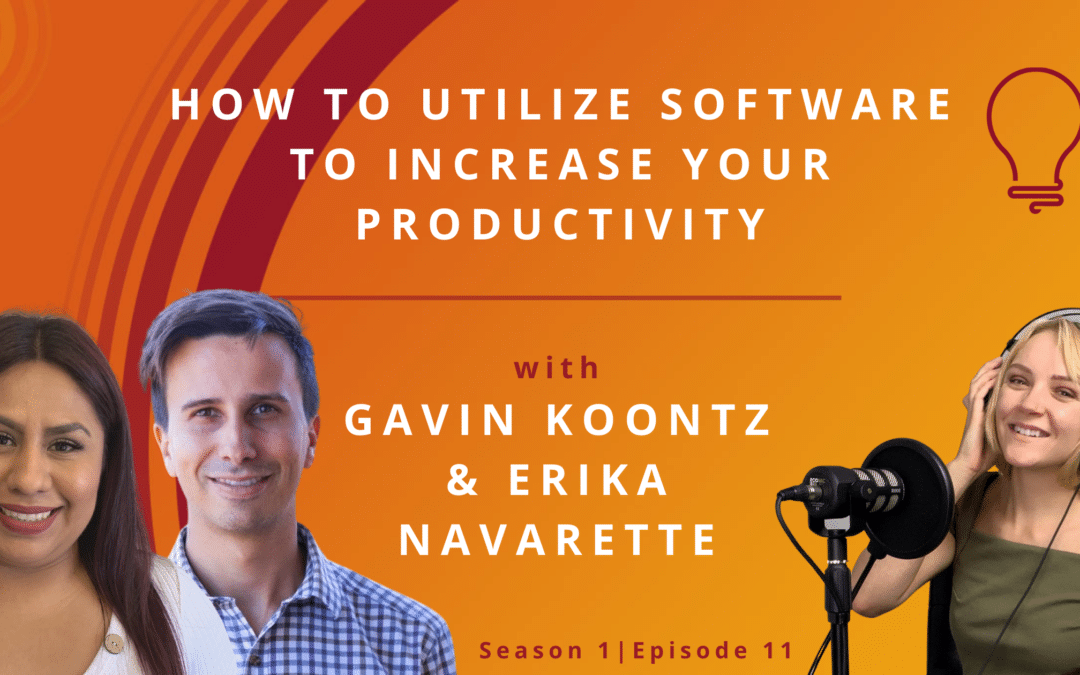From being able to manage leads at a faster rate and with less hassle to being able to cut back on forgetfulness and human error in the workplace, CRMs are here to stay, and here’s why!
Enjoy Listening To How To Have A Proper Work Life Balance on Everyday Business Solutions?
Click Here To Subscribe On Your Favorite Platform!
About Our Guest(s):

Gavin Koontz
Senior Account Executive - Smart Financial

Erika Navarette
Account Executive Team Lead - Smart Financial
Erika Navarette and Gavin Koontz were Neil Thobani’s first thought when I mentioned doing a podcast episode with Smart Financial. He saw a great opportunity to share the expertise of his team with our audience and we couldn’t agree more! Erika is an account manager with Smart Financial and Gavin is a senior account executive.
We wanted to work with Smart Financial for this episode because when the world went remote, it was usually a company’s technology that helped determine if they would be able to transition an office that had once been in-person. CRMs are browser-based customer management tools that, for many, have already been the edge up in their field. Erika and Gavin help break down why that is and what things to look for if you’re in the market for your own CRM.

Episode Transcript:
Halie Morris 0:31
Hello everyone, and welcome to Everyday Business Solutions. My name is Halie Morris. As always, I’m your podcast coordinator and host.
With me today I have some really cool people from Smart Financial. I have Gavin and Erika with me and they’re going to take a chance to just introduce themselves and also tell us a little bit more about what Smart Financial does. So if you guys don’t mind.
Erika Navarette 0:53
Thank you for having us. My name is Erika, Erika Navarette. I’m an account manager at Smart Financial. So what we do is very magical. We connect insurance agents with new consumers every day, and we cover the entire country.
Now on the consumer side, we connect them with insurance agents that can either give them a better policy, a better experience the best better customer service. So we’re making a lot of people very happy.
Gavin Koontz 1:27
Yeah, my name is Gavin. I’m with Smart Financial as well. Just to pair it off of what she’s saying, we work directly with insurance agents.
So our job is to make sure that the people we’re connecting them with end up becoming sales. We are all about making people effective with their process and that’s what we do.
Halie 1:49
Thank you both for that introduction, I think it is really cool what Smart Financial does.
As a little background for our listeners, our parent company, Double A Solutions often works with Smart Financial, because we also work with the insurance companies to provide a CRM, and also an auto dialer.
What we’re actually going to be talking about today is CRMs, because when you have huge pivots in society and when you have huge times of changes, if you don’t have the right processes, support, and systems in place, you’re more than likely going to slip and fall.
So we’re going to dive into what exactly makes a CRM beneficial to a business, and how you can go about picking one, choosing a different one, or optimizing your own if you’re in that boat.
Would you start off first by telling us what your definition of CRM is, as you know it?
Gavin 2:50
Sure. I’ll go first on that one. By definition, it’s a Customer Relationship Manager. That’s what we do. That’s what we use a CRM for.
How do we make these customers and manage these prospects that we have? How do we make them into customers?
Erika 3:09
What a CRM does is to manage, or help you organize, and automate your workflow. You are either gonna call your consumers, email them, or text them and so the CRM will help you do all of that so that at the end of the day, you can do what you do best.
In our case, our agents can stick to selling policies, and depending on any other type of business, they can stick to doing what they do.
Gavin 3:37
I’ll just add to that quickly. We focus a lot because of our role in connecting with the consumers. That’s kind of the big hurdle we face, getting the policy sold, but there’s so much more to it, too.
If you are the business owner, the CRM helps you stay organized, stay on top of your stuff in the same timeline that you wanted to, and not let anything just fall off into unmanaged riffraff.
Halie 4:11
To kind of summarize, from my perspective, it’s about optimizing those background processes and nuances of what you do to connect with your customer in order to do what you came into work to do at the beginning of the day and at the beginning of your business.
It’s really cool because, from your guys’ perspective, you use a CRM, but it’s not like where we sell one. You recommend them because of their functionality, because of their use, and their benefits.
So if you don’t mind, tell me a little bit more about the benefits that you see on your side as far as specific features that actually cause that optimization.
Erika 4:52
Well, automatic dialers are important. That’s one of my favorite integrations. From my side, I can take a look at the analysis that the CRM is reporting.
I can use that to maximize their investment and exposure to the areas we’re seeing the best results from, and help to strategize the game plan for the coming weeks and months.
Gavin 5:17
Yeah, and with my agents, a lot of times it’s just the question of when I start working with a new agent, I say, “Hey if you want to make these leads work better, we should take a look at what we’re doing.”
Usually, a CRM is the first place we look, because if you’re not using a CRM, you probably don’t know how many calls your people made today, how long they were on the phone, what prospects they talked to, what kind of notes were left on them, and what kind of disposition status those leads have.
So a CRM helps you stay organized and then make sure you follow up at the right time. Along with that, just as a business owner, you’re paying a lot of money for leads and then someone like me says, “Hey, well, you should definitely invest in a CRM.”
They ask me, “Why? I already spent all this money on these leads. What features am I going to get out of it?”
What I say is, you want to use a power dialer? Do you want to stay organized, leave your notes, have clarity on what your people are doing? Just be able to, at a glance, know where you’re at with your leads or just any of your business prospects?
You don’t really want to have to dive in for 15 minutes to figure out ‘Oh, Frank told me to call him back a couple of weeks from now, but what was the thing that he asked for and I realized I just missed that by a day because I didn’t have a CRM that told me to call him.
Halie 6:49
That’s good. It’s cool with a CRM, a really great way to think about the history notes and some of the tracking that you do as if it’s increased memory. It’s like your backup drive for yourself.
It’s your own notes. It’s your own hand that makes them. A machine isn’t running your calls and creating the notes for you. It’s you doing it. It’s you doing all the input and all the work.
It’s just making things more efficient around the people aspect of what you do.
Gavin 7:22
Yeah, we’re all people. I wish I had an iron trap memory and could remember ‘Oh, I told him I’d call him in two days,’ but I’ve got too many other things going on. CRM is the only way I can get it done.
Halie 7:35
Yeah and I don’t know about you guys, but the way time passes, I’m pretty sure two weeks flies by way too quickly than what it’s supposed to. Especially because it was just March yesterday.
Gavin 7:50
Yeah. That was the last time I left my house.
Erika 7:55
Another thing I noticed, I see the difference between an agent who does have a CRM and one who doesn’t. It’s very obvious sometimes. They’re having better success whenever we know there’s a CRM involved in their follow up and in their campaign.
So it makes the difference. It really does. Investing in it, it is worth it, especially with us. That way, they can completely maximize their investment with us.
We see it and we recommend it every day and we integrate with a lot of them. There’s a lot out there, but there’s probably a few features that might be more important to others, depending on the business. So we support many CRMs.
Gavin 8:43
If I could just add a little to that. Depending on what industry you’re in, for the people that are listening, they may not be insured or I’m assuming they’re not.
There’s a bunch of things that you realize that, like just interacting with a customer, it’s never one call, we’re done, and move on with life.
There’s usually like, he’s ready in a week and now I got to call him in a week to remind him, but I also want to send an email a day before to make sure that he knows I’m going to call.
If I’m telling myself, okay, Gavin, remember to email this guy on Thursday and then call him at 12 o’clock on Friday. I have too many things to do. I wish I could do that, but it’s just one of those things where it helps you make sure that you get to the end product or end state that you want.
So whether you’re dealing with a customer, just a task, or anything that your business needs, how are you tracking that. Are you using a calendar where you write handwrite it in there?
I love doing that, but also, that calendar doesn’t slap you in the face and say hey, you needed to call this guy today. That’s what I like about my CRM. It tells me what to do.
Halie 10:01
I like it too, because, for example, if you do call somebody during an appointment, you forget to enter the notes and check that off, it’ll put it in your lead into neglected or indicate that you’re late and you didn’t do that task.
Then you can actually go back into the notes and be like, “Oh, yeah, I have to schedule this appointment to follow up” versus if you’re just relying on a calendar and you forget to write it, then you forgot to write it. If you have to follow up in a week, two weeks, or six months, you forget to follow up.
Erika 10:33
Yeah. Anything that we do manually just takes longer and that delays our goal at the end of the day, which is to make sales in all industries.
When we’re selling a product, sales reps are hungry for sales. So it isn’t anything that they’re doing wrong. It’s just that there’s a delay between the manual calling that they’re doing, the manual emails, and it just it’ll speed up the process a lot with the CRM when it is implemented.
Halie 11:06
The one thing I noticed, too, that is probably especially big right now when we have so many people working from home, it reduces some of that human error.
We were talking about dropping the ball on appointments and stuff like that, but other things as far as how you enter where people are at, it’s easier to pick out incongruencies or where things were missed.
It reduces that error so that people can be confident in their job, because, especially if you’re training someone new and they’re making mistakes, sometimes it’s very disheartening, and that’s not necessarily a character fault.
It just means they want to do good, and they feel they aren’t. So the system gives them room to focus on what they’re doing and celebrate those successes.

Gavin 11:55
Yeah. If I could just make a point real quick. If I am talking with my agent, and we’re asking like, what’s the difference between one that uses CRM and one that doesn’t-
A lot of times, if someone’s asking me why they should get a CRM, I’ll say, go time one of your agents working one lead. Figure out how much time that takes exactly. Is it two minutes, three minutes, four minutes?
Then let’s think, if we have a 20 to 30 to 40 percent contact rate with our leads on one call, then we need to make X amount of calls. If it takes me three minutes to make that one call, to pull up the paper, look at the name, look at the phone number, dial the phone number, then make the call, leave a little note, a file that paper, pull up the next paper….
All those little steps add up when you scale them, they’re your bottlenecks. With a lot of my agents, it’s how many minutes is that going to take? If it’s three minutes and I can get you on a CRM, I can get that down to one minute.
You’ll start the phone call, you’ll have your notes ready, they picked up or didn’t pick up, move on, already dialing the next call.
That’s also just a lot easier for us as people to sit down, get those calls done by clicking a button and leaving some notes, not by having to literally hand key 10 digits for each name, and then go through that whole process. It’s just so much easier on us as people to use a system that facilitates all that stuff.
Halie 13:30
And other people are. So if you’re working in the insurance industry, or you’re working somewhere else, a lot of times the competitors are already using a CRM, because it is so efficient.
It makes sense and it doesn’t matter if they’re all doing it. Even if one is doing it, they’re taking your customers… So if you’re not beating them to the ball, you might drive yourself right out of business at the end of the day.
With that, we’ve mentioned that it hinders you significantly if you’re taking leads from Smart Financial, or someone like you, and you don’t have a CRM to put them in.
Do you know what it does as far as the amount of those leads that actually get contacted versus not?
Erika 14:19
There is a lower contact rate when you don’t have a CRM. A few months ago with the pandemic, we knew everyone was home. Everyone’s schedule was a little predictable. They were easier to contact.
But now everyone’s going back to their normal routines going, going back to work. So when we’re calling someone that we don’t know what their schedule is, it may require multiple calls to get a hold of them at the time that’s best for them.
We’re all busy living very fast-paced lives. It may not always be easy to get a hold of someone if you’re only calling them once a day.
Let’s say you’re calling that consumer once a day at the same time. What if you’re calling them the same time that they’re on they’re driving to work? You’re not going to get a hold of them.
So CRMs will help you automate the times that you’re following up with your consumer and help you call them at a different time. It will tell you when to call next when to email next when text next. That improves your contact rate automatically.
Halie 15:19
I see it affects that, but then what about the ability to be quick about contacting them- forgetting the word right now- but that quick response?
Gavin 15:33
Speed to dial. A big thing in the industry is if I get a lead right now, that means someone just filled out a form. They’re sitting there waiting at their computer for someone to call them and give them the actual quote.
A lot of people get really focused on this. They say, “Hey, if I get this lead if I miss that speed to contact if I’m five minutes late? Well, you know what they’re already on a phone call with another agent. So I missed that opportunity,”
In every statistic you see everywhere, it will say that if you’re working your leads, you’re like 200 to 300 percent more likely to be able to contact that lead if you call them within the first five minutes.
So a CRM is going to help you. For example, how our stuff will work; we would port directly into the CRM, you get a little notification and a lot of CRMs will have the option to just immediately start a phone call.
Then you’re faster than a human. I guarantee it because it’s just on.
I think that’s a big thing, but also if they don’t pick up, the lead is not done because you made one call. In fact, if you look at the old advertising rules of it takes seven to ten contact attempts before someone even makes a decision on an ad.
You see the Coca Cola banner go buy, go buy, and go buy again, but until the seventh or tenth time, you don’t decide yes or no. It’s just kind of passing by. I think that definitely applies to leads.
Sometimes people don’t expect the phone call or they’re maybe more resistant to answering a phone call. Email me all that stuff! I prefer that.
Well, if you’re a sales agent, you want to get on the phone. You want to have a phone conversation, not an email conversation where you send them the rate, and they say, “Oh, that’s high.” You’re like, “no, it’s high because of the coverage I gave you and the things that you need.”
You don’t really have that same ability to have that conversation through email, at least in my opinion. So I think that if you have a CRM and you get the lead now and you call them right away, because you have that feature, and they don’t pick up?
Well, I think it’s a great idea if you call them in an hour. If we just think about getting multiple leads a day, and so they don’t pick up on one call, now I have a call in an hour. Do you like setting a timer on your phone? How are you doing that?
That’s just so hard. If I had a CRM that just teed up a call in an hour and said, hey, it’s time to call this guy again, my job is so much easier.
So I digress, but I love CRMs.
Halie 18:05
But that’s the point, isn’t it? You’re passionate about it, even though it’s not a product that you sell, because it actually is so beneficial. You guys use one too, right?
Erika 18:16
We have our very own call center as well, which is smiling and dialing all day long for our agents. They go through many calls throughout the day to get the contact and we see what it does, even on that side.
Halie 18:33
It’s huge and it’s so good to hear. Not only are you pressing it to these new consumers, because it’s beneficial to them, but you can tell firsthand why it’s beneficial because you use it in the house. I feel like that’s a huge thing as well.
Gavin 18:51
You’ve got to remember that our job relies on the agents selling the leads. If they’re not making a return on investment, they’re not going to be our customers for very long. So it all hinges on this kind of stuff. That’s why we like it.
Erika 19:06
Our ultimate goal is to have a long term partnership with our agents because no one is driving around looking for them. The digital transformation that we’re going to, this is why consumers come on the internet, on a website like ours, and are actively looking for them without knowing how to find them.
So that digital transformation has made the shift in our industry anyway and the way our agents get consumers in their books.
Halie 19:35
It’s like you said, it’s so much different these days and there’s such an emphasis on instant gratification. From the business side, you have to be able to keep up with it.
You have to be able to respond because somebody is already doing it. That’s why the demand is already in place for a quick response.
I want to move on then to talk about when someone is looking for a CRM and say they’re listening to this episode right now. They say, “That sounds like a great idea and I don’t have one yet.”
First off, what if a business says, “what if I’m too small? I only have 10 people. I don’t think I need a CRM because I think it’d be too big of a system,” what do you have to say to that?
Erika 20:26
What I recommend and what I see is that the numbers play such an important role on our end. So although they have that means, knowing that there are 10 sales reps right away, I know they need at least 100 leads a day.
That sounds like a lot to some agencies, but it really isn’t when you have a CRM that can help you automate the workflow and it takes off.
It will also allow the sales reps to stick to what they’re doing. It’s selling the policy and going through more leads quicker and faster.
So the numbers play such an important role, even when we have agents that are a one-man show. They also require a CRM and it allows them to go through more leads faster, especially when they don’t have sales reps selling for them. They’re doing it all.
As a business owner and a one-man-show, CRM is even more important. The smaller you are, the more important the CRM is.
Gavin 21:25
It’s a great question because seriously, there are people who sign up for this and they said, “I just spent $1,000 on these leads. Do you mean that I need to buy another product? Why didn’t you tell me this when I sign up.”
Well, we don’t sell a CRM, but you should have one because, frankly, if you’re expecting to get a certain return on some leads- First of all, how are you tracking that? A CRM.
So you want to make sure that whatever investment that you make on whatever your lead base is if you’re buying leads or something like that, that you actually recoup that cost. In my mind, it’s almost like you’re doing a halfway attempt if you’re not using one.
Because you’re saying, I’ll remember all the things I’ll do all the work. I’ll do all of the heavy liftings myself. But what’s going to happen is, in a couple of weeks, if you don’t immediately see the results that you’re looking for, you’re not going to want to do all the heavy lifting.
It’s going to be so much harder. Your mojo will be gone at that point and you’re not seeing the results. You’re thinking, “Oh, should I give up or what? There must be some other solution.”
But what I would say is, if you had gotten a CRM or if you get one now, you can then take all your effort, and you could streamline it to just that 80/20 rule, that 20% of the things that really are going to give you the value. That’s the stuff that you as a person should be involved in and the rest of the stuff, let your CRM do it.

Halie 23:05
It made me think, as you were talking of, to get leads from a source like yours, so they order the leads or they work with you and they purchase the leads and they’re waiting for them to come in-
It’s almost like showing up to a race, getting in your blocks, and wearing regular tennis shoes instead of getting a pair of spikes.
Yeah, you’re gonna be able to run the race and you may be pretty fast, you may actually not do half bad, but that person who’s got spikes on the bottom of their shoes that are built to fit their foot just right is going to probably outsprint you 90 percent of the time because they have the tools to support the race they just signed up for.
So that’s what I thought about as you were talking about it. I was on track for five years and it’s what made me think of it. I admit I did high jump. I did not run but it makes me think, what if I had shown up to high jump in just my tennis shoes. I would not have gotten very far.
Gavin 24:10
Coming from my perspective, and I love track- I used to do cross country- but I just built a bunch of woodwork stuff. I realized having the right tool for the job makes the difference in being able to do the thing the way you want it to do or like cobbling it together.
There’s a big difference but just have the right tools and don’t do all the work. Don’t make it so much harder on yourself. Use the right tool.
Halie 24:39
We just did laminate on our basement walls. It gives it a really cool, lodge feel. It makes it look super expensive and it wasn’t, but if we hadn’t bought the nail gun I’m sure we would have had a field day putting those boards up.
Gavin 24:52
And it wouldn’t have looked as good.
Halie 24:55
No, and it wouldn’t have gone nearly as fast. Especially because the first time we got the wrong materials and it all fell down.
Gavin 25:04
Nice.
Halie 25:06
Yeah. So I had to stop there because of putting that into perspective, that’s what people are doing if they come to you, and they want all these leads. They order a bunch of them and they don’t have the tools to support it like a CRM.
All right. So this person who’s got less than 10 people in place, right? You were talking to them, and they say, “Okay, I’m gonna do a CRM. You’ve convinced me. But CRMs are big.
I just did my research and there’s a lot of things in them. What features should I look for first, if I want to start my research, and I want to start talking to these companies to sell them?”
Gavin 25:49
Well, if I were to jump in here. I’m not an expert in what any other business needs. I can just speak on insurance and I just know that there are certain things, if I were to evaluate that 80/20 rule that I was talking about earlier, what are the things that actually make me get me results?
I want to put myself in those activities. I want to also have a good organization so that I never miss those opportunities and I’m on them.
If I’m a business owner that needs to make sure my people hit a certain number of calls a day or hit a certain metric every day. I want that kind of stuff to not occupy my mind.
So I want to look for all the features that I would need to manage the elements of my business that I might need. Do I need inventory management? Do I need hour management? Let’s get that stuff in order so you can focus on the important stuff.
Erika 26:51
The metrics of the results we can see, they can see exactly what revenue is coming in, if there are any losses as well, or if something’s not working out.
They can take a look at all that or with their team, they can also see who may need some coaching, who’s not selling enough, who’s not producing enough. They can also take a look at all that. A lot of the time, their team may also need some coaching on selling their product or improving their process.
Halie 27:27
I would agree and I think the only thing I would add to that is that the last aspect is training. Make sure that not just the front end training is there because that’s great, but that you also have continuous training.
If you bring on someone new, or if you add a feature, or you’re using it and you just want to optimize your use of it further, CRMs are big. That’s why I asked that question. They’re huge systems.
A lot of times you start smaller and you work with a couple of different features. You learn those and then you grow. You optimize more of the system over time versus gung ho, feet in.
I don’t think there are too many people who can actually go at all the features of a CRM the first time and just have it mastered in a day. So it is really important for, like you said, identifying those areas that are important.
Gavin 28:21
Could I just say that one thing that I know you should look at is to make sure they have good support because there’s a lot?
CRMs they’re very technical and if you’re the person trying to figure out how to make the tech work, especially if you’re a business owner, you’re focused on other things. You’re not a computer expert, which is most of the people I deal with. You want to be able to pick up the phone, talk to someone, have them show you what to do.
Also, what’s always great is having a website that has a really good support page where if I did want to just get it done myself, I can look up the problem that I have or the instruction manual, and very quickly find what I need. I think that’s huge.
Halie 29:06
If you have a bigger team too, your own team is going to be calling up or looking for information to help them. To be able to have both options available, to have really good options on both sides, they’re able to seek the help themselves and then possibly even help get their teammates up to speed.
All right. Well, I think we’re getting to a good point where we can start wrapping up so I want to ask you both; what advice would you give somebody who is looking to either optimize a CRM that they purchased already or are looking into purchasing their own CRM for their business to help it grow?
Gavin 29:49
Want me to go? I’ll go. Let’s do this!
I would say, do an audit of your current actions. Where are you strong in? What are you actually getting done? Just do a clear-eyed look at your activities and just say, where do I need help?
If you’re unsatisfied with any of those numbers when you take a look at that, figure out what systems you need in place to increase that. Start that process now.
Erika 30:24
At the end of the day, the cost will pay itself off. If someone’s afraid to invest in a CRM, from what I see the losses are worse than just taking the time to spend a little bit more to improve your system and follow a process better.
Halie 30:46
Alright, thank you both. Thank you, Gavin. Thank you, Erica, for coming on the show today.
Thank you everyone for tuning in for yet another episode of Everyday Business Solutions. I want to remind you, don’t forget to subscribe if you aren’t already and give us a review. Let us know what you think of this episode and the other episodes that we’ve had so far.
I love learning from people like Gavin and Erica, but I also really love hearing your feedback as well. It is extremely valuable. Thank you and have a great day.

